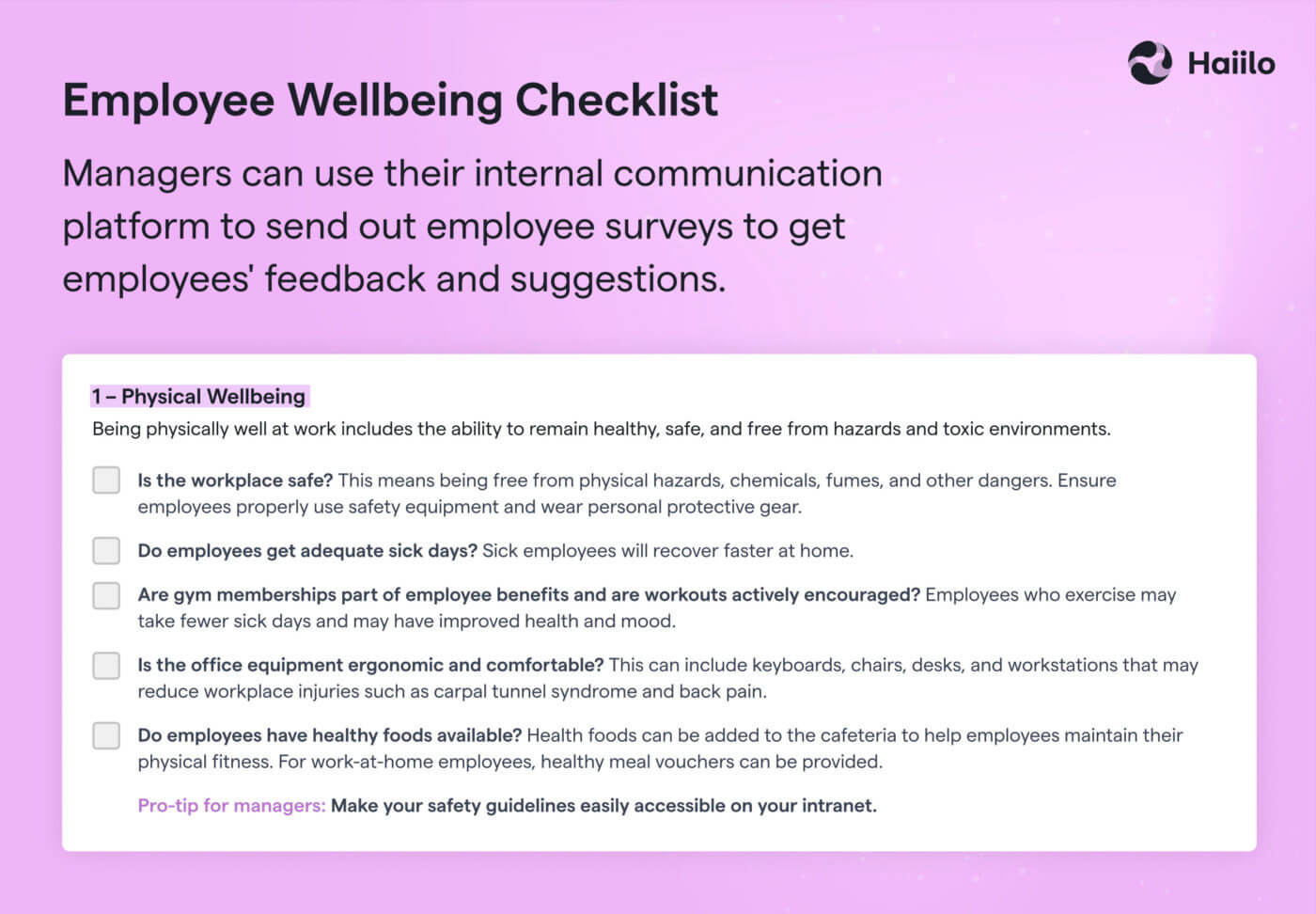Measuring employee engagement is critical to any business’s success, regardless of industry, headcount or location.
Running employee engagement surveys is a great way to find out whether employees are passionate about their job and proud of being part of the company they’re working for.
But here’s the thing, measuring employee engagement doesn’t come easy.
Who’s in charge of employee engagement in the company? Have clear goals been set before measuring it? And how are you going to use the collected information afterward?
And most importantly, how to build a great employee engagement survey, what questions should be asked to your employees?
We’ve asked 16 Internal Comms and HR experts to share their favorite employee engagement survey questions.
Improve the levels of engagement in your company by using the right IC tools
The Importance of Employee Engagement Surveys in the Workplace
There are different ways to measure employee engagement in the workplace. No matter the methodology you’re going to use, the key here is to collect employee feedback.
Indeed, when it comes to measuring employee engagement, information is the key.
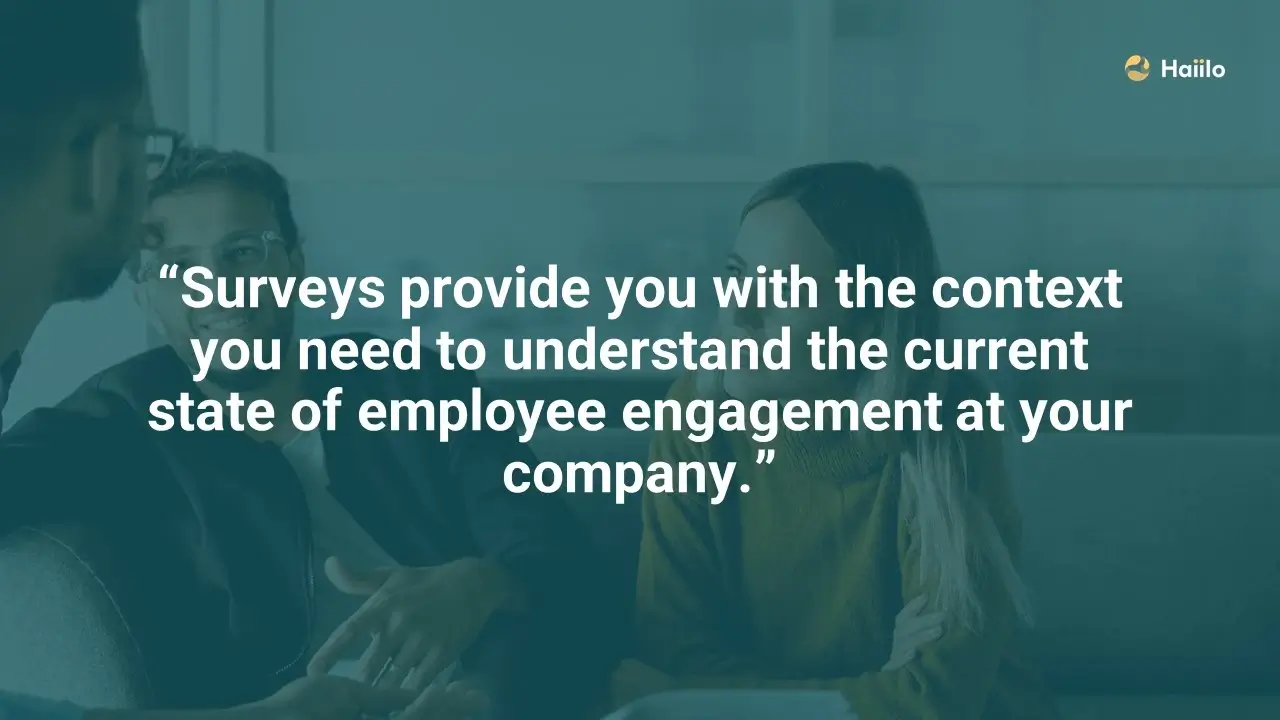
Don’t trust your gut feelings. Don’t make assumptions. Instead, investigate. Initiate dialogues and encourage discussions in the workplace and most importantly, ask questions to your employees.
In sum, you need to become the Sherlock Holmes of your company 🕵️♂️
And don’t get me wrong here — I’m not doing a fancy analogy because I like reading Sir Arthur Ignatius Conan Doyle’s books, you can actually find Entrepreneur articles on the same analogy!
Read on: 8 Employee Engagement Statistics You Need to Know in 2020 [INFOGRAPHIC]
8 Top Benefits of Running Employee Engagement Surveys
As mentioned earlier, there are different methodologies and tools to measure employee engagement.
But the cool thing about employee engagement surveys is that they allow you to collect both quantitative and qualitative data, which is essential when it comes to employee engagement.
Think about it: when you measure employee engagement at your company, you need to understand how your employees feel about their jobs, the company, and the business environment they’re working in as well as the reasons why they’re feeling that way.
And employee engagement surveys provide you with the context you need to understand the current state of employee engagement at your company. That’s the only way you can implement the right changes at your company.
Read on: Change Management: Definition, Best Practices & Examples
What’s more, you can tailor the questions you include in your employee engagement survey as much as you want so the results you get out of it help you understand whether the objective(s) originally set are achieved or not.
In a nutshell, employee engagement surveys allow you to:
- Survey your entire workforce
- Collect insightful feedback within a short period of time
- Decide whether the survey is anonymous or not
- By using a mix of numerical scale and open-ended questions, you can collect quantitative and qualitative data so you can get a better understanding of how your employees feel about their jobs and the company
- Measure how passionate and committed your employees are
- Gauge whether there will soon be a turnover problem
- Let employees freely share their feedback if you add a question to the survey where you ask employees to share open feedback, usually at the end of the survey
- Compare results over time to keep improving employee engagement at your workplace
Conducting an Employee Engagement Survey Doesn’t Mean Measuring Employee Satisfaction!
Even though many people use these terms interchangeably, keep in mind that employee engagement and employee satisfaction are not the same thing!
While employee engagement is the emotional commitment the employee has to the organization, employee satisfaction describes how happy employees are with their jobs. Same same but different!
An employee can be satisfied with a job without feeling engaged. Even though employee satisfaction can be enough to retain top talent, it may not ensure high employee productivity and innovation in the workplace.
Read on: Top 15 Employee Motivation Tips and Benefits
Charles Rogel, Vice President of Product Development and Senior Consultant at DecisionWise says:
“The factors that drive employee engagement are different than those that drive satisfaction. Employee satisfaction is the minimum entry fee that needs to be met in order for an employee to be fully engaged”.
So, when you run an employee engagement survey, remember that you’re not measuring employee satisfaction — even though some of your questions may be related to employee satisfaction as it’s a driver of employee engagement!
How Often Should You Run an Employee Engagement Survey?
Surprisingly, HR Zone found that most organizations conduct their employee engagement survey annually, with 18% surveying more than once a year and 4% using a system to continuously collect employee feedback.
Even though employee engagement is a top priority for most organizations, it seems they don’t measure it often!
The thing is, when it comes to employee engagement, you need to measure it regularly.
That’s the only way you can keep an ongoing dialogue with your employees and identify the things that need to be improved as quickly as possible so you can implement the required changes to improve your workplace right away.
Read on: Company Values: Definition, Importance and Examples
Employees are usually not fond of vague answers such as “we’ll get back to you on this matter soon” or “we’re working on it”.
Instead, they want you to take clear actions that help improve everyday life at the company. And to do so, you need to collect their feedback as often as possible so you can quickly adjust your employee engagement strategy.
Conducting employee engagement surveys every 12 months or so isn’t the optimal way to improve the work environment!
Instead, try to collect employee feedback on a semester basis or even quarterly if you can.
Of course, how often you conduct this type of survey depends on the company size, internal structure, and the resources you have, but try to survey your employees as often as possible!
What Are the Best Questions to Ask in an Employee Engagement Survey? 16 Experts Share Their Thoughts
Now that you have a clear plan for your employee engagement strategy, the next step is to craft the right employee engagement survey for your business.
I deliberately said “the right survey for your company” because not all businesses will ask the same questions to their employees.
There’s no unique way of surveying employees.
Indeed, the questions you’re going to include in your survey will depend on the business objectives you want to achieve as well as the way you define employee engagement.
To help you with that, we’ve asked 16 Internal Communications and HR experts for their favorite employee engagement survey questions.
That way, you can get ideas of topics you may want to cover in your next employee engagement survey!
Amy Sands Hadsock, Senior Director, News Channels at American Cancer Society
“Does the company provide you with opportunities to build connections with your co-workers near and far?”

A little bit of context: “Companies oftentimes overlook the importance of giving employees opportunities to build connections with their co-workers. As more companies embrace remote working and there is less face-to-face time, it’s even more important that an intentional effort is placed on providing employees with easy ways to engage with each other.”
“Employees that have connections and relationships with their co-workers become much more committed to the company and their role, which leads to higher retention rates and increased productivity for the company”, says Amy.
Gonzalo Shoobridge, Head of Action Consultancy, Employee Engagement/HR Organisational Development Solutions at Great Place to Work UK
“Management shows a sincere interest in me as a person, not just as an employee”.
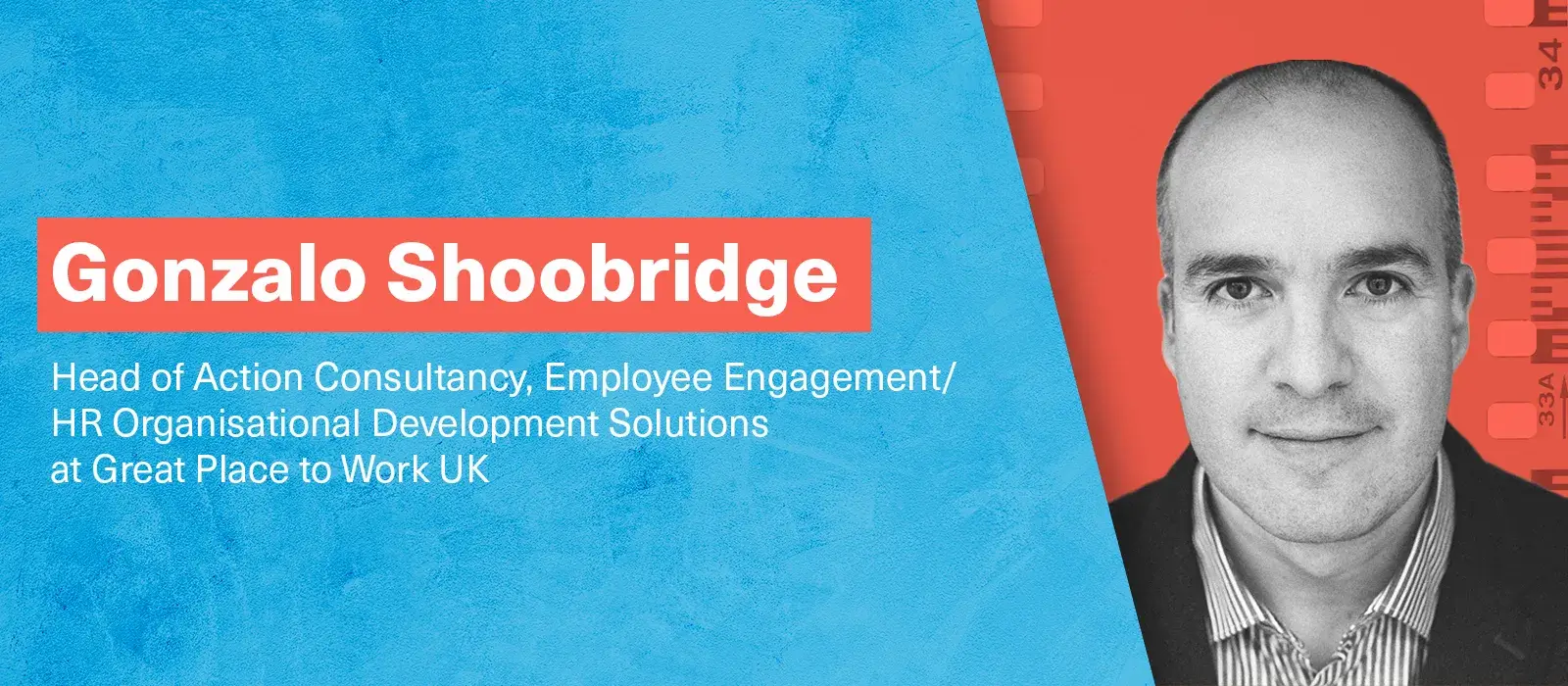
A little bit of context: “This statement clearly measures organizational culture at its core, how employees perceive the way they are treated by their managers and senior leaders. Do they demonstrate a genuine interest in people as individuals, not only as employees with certain responsibilities?”
“It encompasses management’s recognition of people’s lives beyond their role as employees. It is a key indicator to assess if employees feel they are being treated with respect and dignity, and not just like another cog in the machine”, says Gonzalo. Read more here.
Denilson Miguel, Employee Engagement & Culture Lead at Ciox Health
“If you won the lottery and decided to leave your company, what would you miss most about your company?”

A little bit of context: “One of my favorite questions is the one above because it enables employees to view the parts of their job or company that they love without including money into the equation. It allows them to see that there are other motivators at play besides money that brings them to work every day”, says Denilson.
Jill Christensen, Employee Engagement Expert, Former VP Global Internal Communications at Western Union
“I would recommend my employer as a great place to work to a family member or friend”.

A little bit of context: “Why this question? Because a referral is the greatest compliment and stamp of approval that one can give! If an employee loves going to work, they will not hesitate to refer the company to people they love. If an employee does not love going to work, they will not want to subject their loved ones to that environment!”, says Jill.
Gustavo Sanchez, HR WW Employee Experience and Culture at HP
“What are we doing fine? What do we need to improve? How would you like to be known in the industry?”

A little bit of context: “The last question is related to integrity, ethics, sustainability. Those questions are very important to me in order to understand the big picture. The good thing is that we read all the comments (yes, we have 55,000 employees!)”, says Gustavo.
Tonille Miller, Global Vice President – Culture, Employee Experience & Leadership Development at Startek
“I feel a sense of meaning/purpose in my work/role/organization”.
And if you can, add a follow-up question asking:
• If yes, what about it makes you feel that way?
• If not, what could we do to enable that?

A little bit of context: “One of my favorite questions to ask in a EE survey (and we do this at Startek) is the one above because it gets at one to understand some of the most fundamental human values and predictors of retention, productivity and expending discretionary effort”.
Additionally, meaning/purpose is extremely important for millennials and gen Z. Today’s work environment differs a lot from those of past generations. Today’s generation will not bow down to the organization or hierarchy, so you need to offer them something they can’t get on their own that transcends the business”, says Tonille.
TJ McIntyre, Senior Corporate Communication Specialist at Blue Cross and Blue Shield of Alabama
“Do you feel like your company cares about you?”
A little bit of context: “We pride ourselves on being “The Caring Company” for our external customers. This is a long-standing tagline for our business”.
“It would be interesting to see if our employees are getting the same message and feel they are cared for by the company like we encourage our employees to care for our customers”, says TJ.
Katy Mallory, Director, Internal Communications – Mobility Solutions at Cox Automotive Inc.
“How likely would you be to recommend working at Cox Automotive to a friend or family member?”
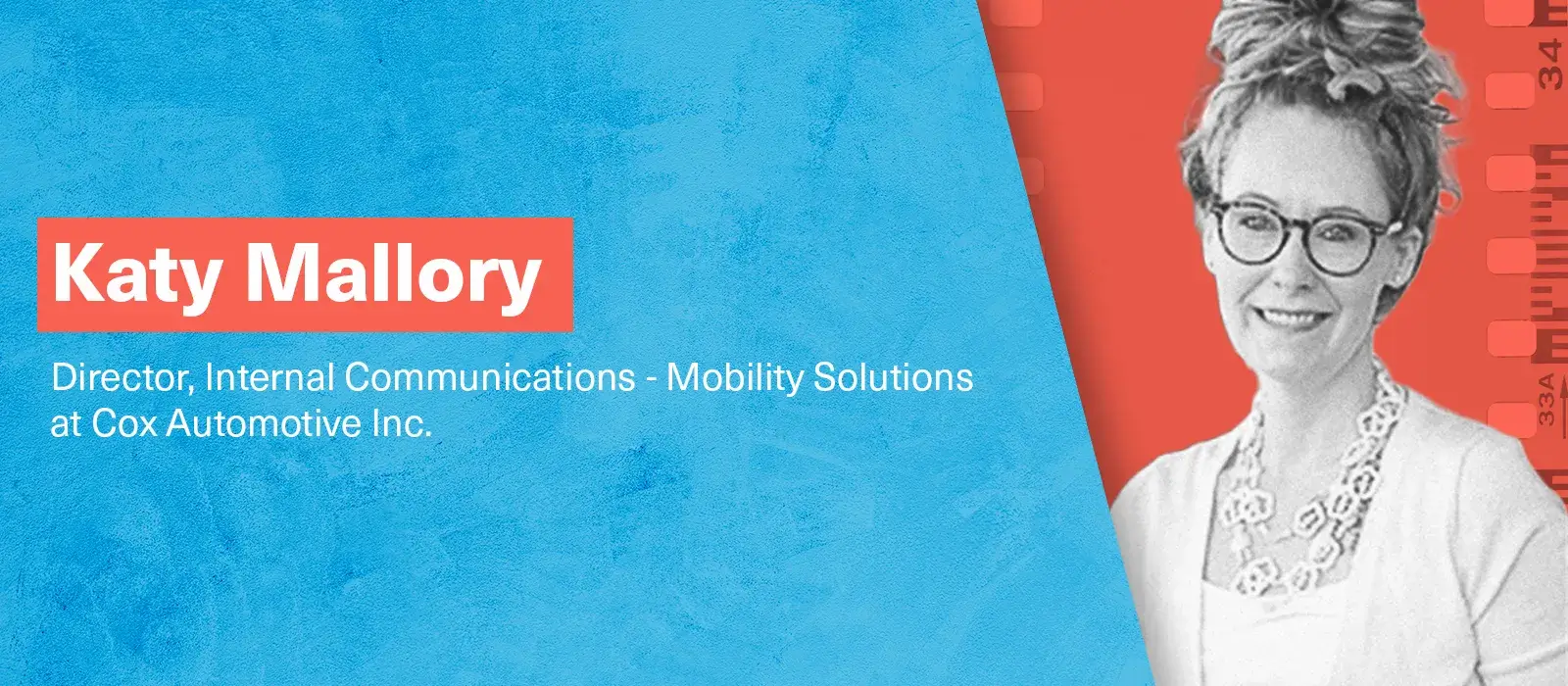
A little bit of context: “I really appreciate this question because it encourages team members to dig deep and think about their employee experience — top-to-bottom”, says Katy.
Rich Baker, Corporate Affairs Manager at Jaguar Land Rover, Hiyu Consultancy Director and Board Director, Institute of Internal Communication
“I have a supportive and inspiring leader”.
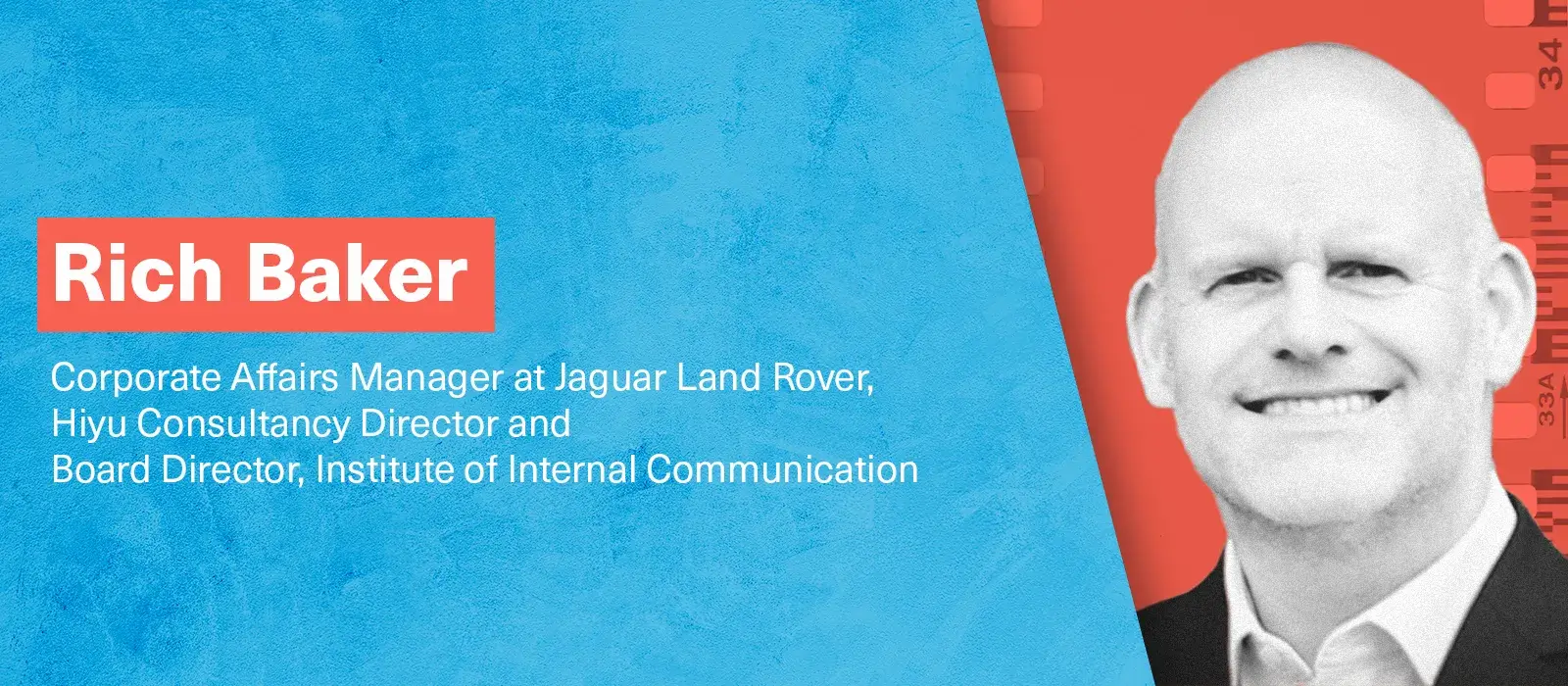
A little bit of context: “The question above is my favorite question. Leadership is so fundamentally entwined with engagement!”, says Rich.
Jyotsna Malhotra, Head of Employee Engagement, Diversity & Inclusion at TVS Motor Company
“Have the management been able to “lead by example” or “walk the talk”, even if they have not been able to keep the commitment, due to various environmental reasons?”

A little bit of context: “My favorite question for employee engagement surveys is the one above, linked to trust in action, where the employees are able to showcase the confidence they have in the manager”.
“Though the question is straightforward, it shows whether the manager or leaders have been able to “lead by example” or “walk the talk”. Do they come forward to accept and regain the confidence of the employees?”, says Jyotsna.
Stacy Sherman, Director, Customer Experience & Employee Engagement at Schindler Elevator Corporation
“Does your manager recognize your full potential, capitalizes on strengths and empowers you to make decisions?”
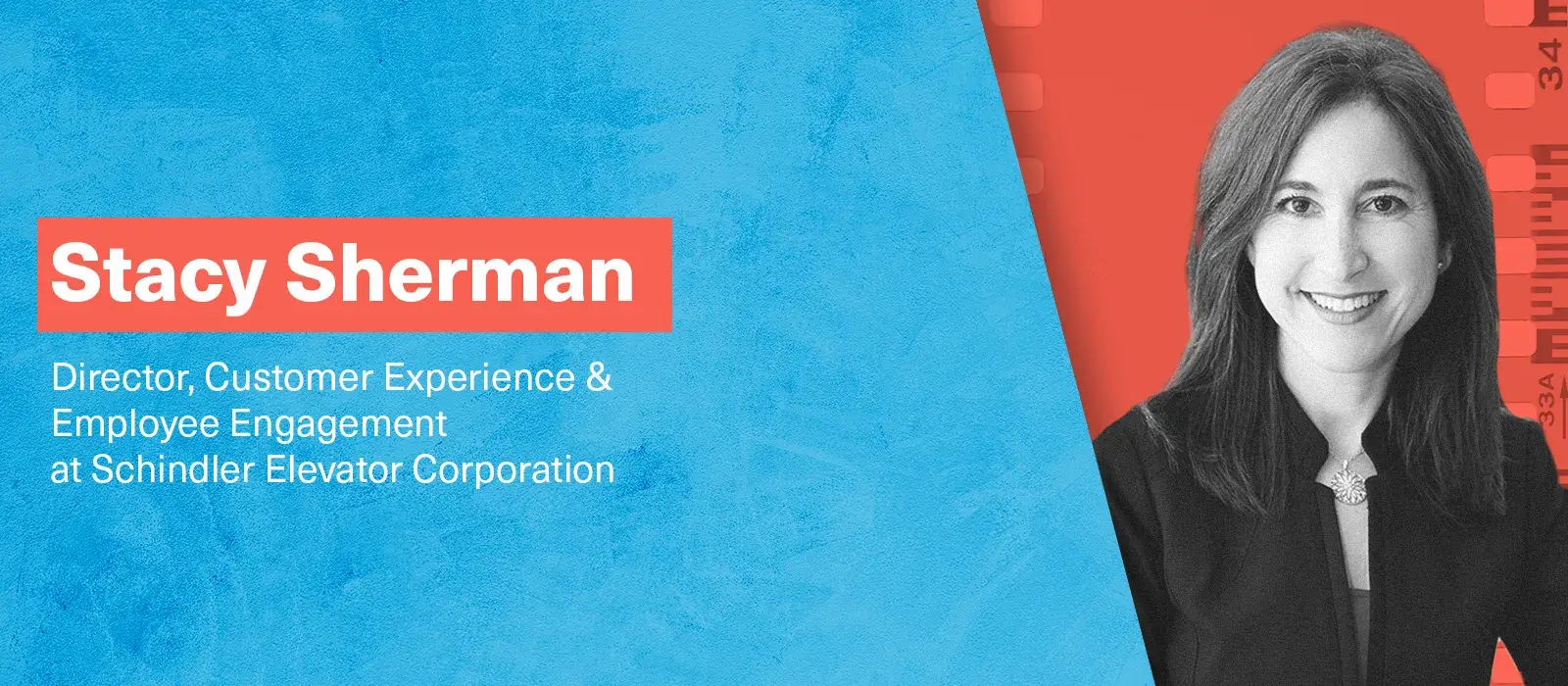
A little bit of context: “I know that when employees feel valued and appreciated, it transfers to customer happiness too. Employees who feel empowered to do what’s right for customers, even when their boss isn’t looking, leads to more customer satisfaction. Both employee experience (EX) and customer experience (CX) go hand in hand and can be a company differentiator”.
“If employees answer NO to this survey question, it’s essential to uncover WHY and then fix their pain points. Let them know what improvements are implemented as a result of their feedback. “Closing the loop” is equally important with employees as it is with customers when they voice dissatisfaction. It’s all part of DoingCXRight”, says Stacy.
Dimple Kaloya, Senior Vice President and Head of HR Consulting, HSBC Global Services and Technology Centers at HSBC
“I have trust and confidence in senior leadership at my company”.

Trust in leadership is essential in the workplace. Simply put, you can’t build a successful business without building trust in the workplace. And to feel engaged, employees need to feel that their leaders, including top management, are trustworthy and transparent. They want to be informed about the business’s long-term strategy and any change management efforts.
Kerri Warner, Senior Vice President, Global Employee Communications at Mastercard
“What’s the one thing, money aside, that you value most at work?”

A little bit of context: “I like this question because it forces prioritization, which is clearly actionable by the organization. By taking money out of the equation, we get to the deeper motivations of employees. Something like assessing the level of agreement on a 1- 5 scale gives us sentiment, but I prefer to get more out of a question. So, if I had to choose one question, this would be it!”, says Kerri.
Ankita Banerjee, Talent Management, People Engagement & Leadership Development at Randstad
“At work, I am aware how my work supports my team and my department/ organization”.
Your employees want to contribute to your business’s success, but to make sure they’re headed in the right direction, they need to know how their work impacts the business’s bottom line. They need to know how they help make the team and the company successful.
Stats are quite alarming: a Robert Half Management Resources survey found that 53% of the employees who took the survey don’t understand how their jobs are actually helping to improve or grow the company. It may be interesting to survey your employees on that topic!
Harsha Vatnani, Manager HR, Head – Employee Engagement & Communication at BSH Home Appliances Group
“Do you feel valued at work?” , “Would you advise your friend to join our organization?”

A little bit of context: “The first question has a direct correlation between how employees perceive their jobs to hold meaning to organization as a whole. It is also a reflection of whether defined job roles have an impact on the organizational goals. If yes, then employees will feel valued at work. While most people take up jobs to earn, if the organization, colleagues, and managers are respectful towards the employee, the perceived value derived from working is more than just your month-end remuneration. This question would help answer that”.
“The second question is related to that. If employees feel happy and valued, they will likely refer their friends or family members as well. They would encourage others to apply to open positions. On the other hand, if an employee doesn’t feel valued or happy or in synergy with the organization, they will unlikely speak passionately about the organization and will probably not try and sell this as a great place to be at”, says Harsha.
Rebecca Bell, Director, People Ops (HR), Employee Relations at GoDaddy
“Would you recommend a family member or a friend to work for this organization?”
Finding out whether your employees would encourage their loved ones to join the company is a great way to gauge how they feel about the company.
Try to be in your employees’ shoes — would you advise your friends or relatives to apply to one of your company’s job openings if you don’t feel passionate about your job and committed to the brand you’re building with your colleagues? Probably not. Employee referrals are some of the best employee engagement indicators!
Key Learnings
As you can see from the questions listed below, motivational factors —apart from employee benefits, leadership and employee referrals seem to be key topics covered in employee engagement surveys.
Indeed, several IC and HR experts have cited questions related to these topics as their favorite questions for employee engagement surveys.
What else can we learn from these experts?
Learning #1: Don’t conduct an employee satisfaction survey to measure employee engagement at your workplace.
As you can see below, none of the experts have cited job satisfaction-related questions as their favorite questions for employee engagement surveys. As mentioned earlier, an employee engagement survey isn’t an employee satisfaction survey!
Learning #2: Ask your employees what they think about leadership.
Whether your employees trust their superiors and feel valued at work will have a direct impact on how engaged they feel with their jobs.
Ask your employees if they feel encouraged, heard, aligned with the company’s vision, and if they have a good understanding of what is expected from them.
Indeed, leaders and the way they communicate with their teams play a keep role in employee engagement. Unsurprisingly, communication skills are some of the most in-demand soft skills in the workplace.
Learning #3: Don’t forget to survey your employees about what motivates them.
Make sure you remove employee benefits-related factors from the equation. Do your employees find their job meaningful? Do they feel they’re getting the support they need from their managers? Do they have a clear understanding of how their jobs contribute to the business’s success overall? That way you can find out what really motivates your employees.
Learning #4: Ask your employees whether they would encourage their friends or relatives to join the company.
Employee referrals are a strong indicator of how your employees feel about the company. As Jill Christensen says, “a referral is the greatest compliment and stamp of approval that one can give!“. What’s more, word-of-mouth plays a critical role in talent attraction! Indeed, 88% of employers said that referrals are the #1 best source for above-average applicants.
Learning #5: Don’t be shy! Ask your employees for open feedback.
Ask your employees what can be done to improve the workplace and support their professional growth. Ask them what they expect from you and their managers. Collecting open feedback from your employees is one of the best ways to identify what needs to be changed to improve employee engagement!
An Agile Approach to Employee Engagement
Keep in mind that conducting surveys is not the only way to measure employee engagement in the workplace.
An agile approach to employee engagement includes different methodologies — employee engagement surveys, but also one-on-one meetings, panel discussions, and pulse surveys as well.
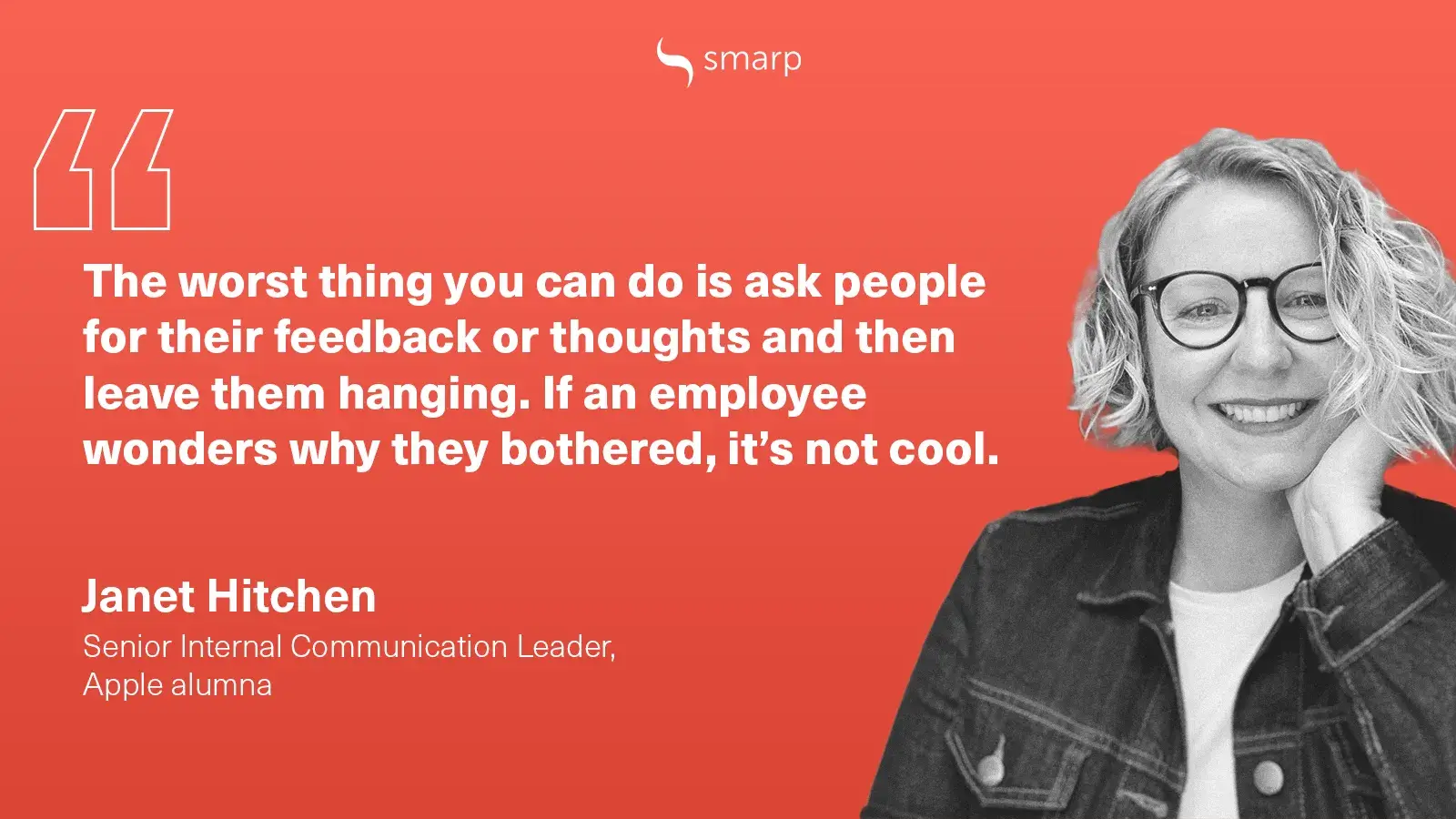
Janet Hitchen, Senior Internal Communication Leader, Apple alumna says:
“I’m not a fan of blanket employee surveys unless there are defined and actionable outcomes that come from the given feedback. I much prefer pulses that allow you to dig into specific issues. They tend to give you greater focus. Then, you can link outcomes back easily and quickly, proving that the feedback is important, acted upon and you’re listening. The worst thing you can do is ask people for their feedback or thoughts and then leave them hanging. If an employee wonders why they bothered, it’s not cool”.
Indeed, the way you’re going to conduct your employee engagement surveys relies on the business objectives and the company culture as well.
All you need to have is a clear understanding of the business goals and a little bit of creativity to spice up your employee engagement surveys!




